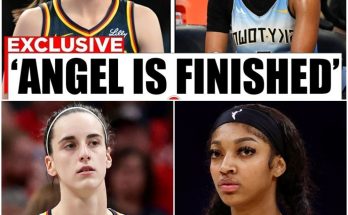Sophie Cunningham ATTACKED Jacey Sheldon For Hitting Caitlin Clark in the Eye!Fever vs Sun
.
.
.
Sophie Cunningham Stands Up for Her Teammate Amid Controversy: A Game Marred by Chaos and Inconsistency
The Fever vs. Sun game was supposed to be just another matchup in the WNBA season, but it quickly devolved into a heated and chaotic affair. The incident that stole the spotlight wasn’t just about the players on the court—it highlighted a larger issue within the league: inconsistent officiating and its consequences. At the center of the drama was Sophie Cunningham, who made headlines for her actions on the court, but the story runs deeper than just one moment of retaliation.
The Beginning of the Chaos
The game began with intensity, as most WNBA matchups do, but it wasn’t long before things started to spiral out of control. Early in the game, Jacey Sheldon delivered a reckless and dangerous play by clawing Caitlin Clark in the eye. This wasn’t a defensive move or a play for the ball—it was a blatant and harmful act that should have been addressed immediately. However, the referees only handed Sheldon a minor punishment, failing to eject her for what was clearly a flagrant foul. This decision—or lack thereof—set the tone for the rest of the game.

The commentators quickly pointed out the severity of Sheldon’s actions, agreeing that it should have been a flagrant two foul, leading to an automatic ejection. “She literally went for the face, not the ball,” one commentator noted. “It was straight-up dangerous.” Fans in the crowd and those watching at home echoed the sentiment, with many taking to social media to express their outrage. The failure to properly penalize Sheldon created an environment where players felt unprotected, and tensions began to rise.
Marina Mabrey Escalates the Situation
As if Sheldon’s actions weren’t enough, Marina Mabrey later blindsided Caitlin Clark while she wasn’t even looking. This was another reckless and unnecessary hit, but once again, the referees failed to take decisive action. Mabrey was only given a single technical foul, not a flagrant, and was allowed to remain in the game. The inconsistency in officiating became glaringly obvious at this point. If Sheldon’s actions weren’t enough to warrant an ejection, and Mabrey’s hit wasn’t either, what exactly would it take for the referees to enforce the rules?
The lack of accountability for these dangerous plays left players frustrated and fans confused. The commentators didn’t hold back, criticizing the officiating live on air. “This is bad for the league,” one broadcaster said bluntly. Their criticism wasn’t just about the missed calls; it was about the message being sent to players and fans alike. If the referees weren’t going to protect the players, who would?
Sophie Cunningham Steps In
Enter Sophie Cunningham. Known for her toughness and willingness to stand up for her teammates, Cunningham wasn’t about to let the reckless hits on Caitlin Clark go unanswered. When the referees failed to take control of the game, Cunningham took matters into her own hands. She delivered a hard hit to Jacey Sheldon, sending a clear message that such behavior wouldn’t be tolerated.
Cunningham’s actions were immediately met with outrage from the referees, who ejected her from the game with a flagrant two foul. While many agreed that her hit was deserving of an ejection, the inconsistency of the officiating throughout the game made it difficult to accept. If Cunningham’s actions warranted a flagrant two, why didn’t Sheldon’s or Mabrey’s? The precedent had already been set—players could get away with reckless, dangerous hits. Cunningham simply followed the tone that the referees themselves had established.
The crowd’s reaction to Cunningham’s ejection was telling. As she walked off the court, fans gave her high-fives and cheers. They saw her not as a villain, but as a hero—a player willing to stand up and defend her teammate when no one else would. The commentators, too, sympathized with Cunningham’s actions. “She did what needed to be done,” one said. “If Sophie had been on the floor earlier, maybe things wouldn’t have gotten this far.”
The Fallout
The chaos didn’t end with Cunningham’s ejection. Lindsay Allen grabbed Cunningham around the neck during the altercation, an action that should have been an automatic flagrant two foul. Yet, Allen wasn’t ejected. She remained on the bench, ready to re-enter the game if needed. The referees reviewed the play but decided to let it slide, further fueling the frustration of fans, players, and commentators.

By the end of the game, it was clear that the referees had lost control. What should have been a competitive and exciting matchup had turned into a spectacle of poor officiating and escalating tensions. The commentators didn’t hold back in their criticism, calling it “a total collapse in game management.” They argued that the referees’ failure to take decisive action early in the game had directly led to the chaos that followed.
The Bigger Picture
The incident between Cunningham, Sheldon, and Mabrey is about more than just one game. It highlights a larger issue within the WNBA: the need for consistent and fair officiating. When referees fail to enforce the rules consistently, it creates an environment where players feel unprotected and tensions boil over. This isn’t just bad for the players—it’s bad for the league as a whole.
Player safety should always be the top priority, and fans expect the referees to uphold that standard. When dangerous plays are allowed to slide, it sends a message that player safety doesn’t matter. This not only puts players at risk but also damages the integrity of the game.
The WNBA has made great strides in recent years, growing its fan base and increasing its visibility. But incidents like this one threaten to undermine that progress. Fans want to see competitive, high-quality basketball, not games marred by chaos and inconsistency. The league needs to take a hard look at its officiating standards and ensure that referees are equipped to handle high-stakes games.
What Needs to Change
There are several steps the WNBA can take to prevent incidents like this from happening in the future:
Clearer Guidelines for Flagrant Fouls:
-
- The league needs to provide referees with clearer guidelines for what constitutes a flagrant foul and when a player should be ejected. This will help ensure consistency across games.
Stronger Penalties for Dangerous Plays:
-
- Players who engage in reckless or dangerous behavior should face stronger penalties, including suspensions and fines. This will send a message that such actions won’t be tolerated.
Better Training for Referees:
-
- Referees need ongoing training to ensure they can handle high-stakes situations and make consistent calls. This includes reviewing game footage and learning from past mistakes.
Transparency with Fans:
- The league should be transparent with fans about how it handles officiating issues. This could include post-game reports explaining controversial calls and the reasoning behind them.
Conclusion
The Fever vs. Sun game will be remembered not for the basketball played, but for the chaos that unfolded. Sophie Cunningham’s actions, while controversial, were a direct response to the referees’ failure to take control of the game. Her willingness to stand up for her teammate resonated with fans, even as it highlighted the deeper issues within the league.
The WNBA has an opportunity to learn from this incident and make changes that will benefit players, fans, and the league as a whole. Consistent officiating isn’t just about enforcing the rules—it’s about protecting the players and preserving the integrity of the game. If the league can address these issues, it will be stronger for it. Until then, fans will continue to demand better, because the players—and the game—deserve nothing less.



